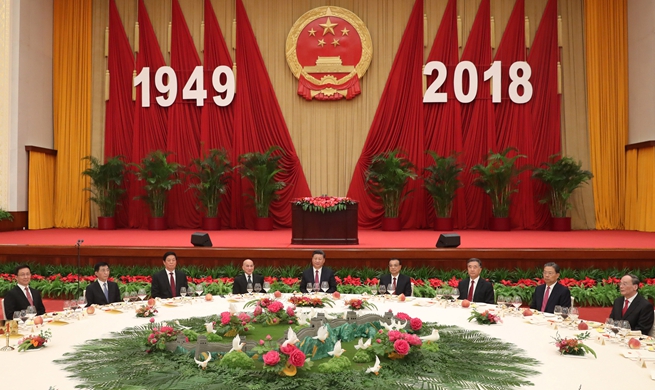BERLIN, Oct. 1 (Xinhua) -- German voters are increasingly convinced by populist ideologies, according to a study published on Monday by the Bertelsmann Foundation.
According to the latest "Populismusbarometer" survey commissioned by the Guetersloh-based foundation, 30.4 percent of voters in Germany could be allocated to the populist spectrum of electoral politics in 2018. The figure marked an increase of 1.2 percentage points compared to last year's survey.
During the same period, the share of voters who had "clearly non-populist" views declined by 4.1 percentage points to 32.8 percent.
"Overall, there is an increasingly populist-oriented electorate in Germany," a statement by the Bertelsmann Foundation read. This circumstance applied particularly to individuals traditionally classified as adhering to centrist politics.
The findings were based on two regular surveys of more than 3,400 voters conducted by the Infratest dimap institute.
Respondents were asked to indicate which party they voted for in the last federal elections in 2017, as well as to locate themselves on a spectrum of right-wing and left-wing positions. They were also asked to answer questions about their view of "popular sovereignty" and political elites in Germany.
Populism was defined by the Bertelsmann Foundation as a concept of democracy which presupposes an objectively-intelligible and uniform "popular will". Society is hereby further partitioned into two separate cohorts of "the people" and "elites" which include politicians, business leaders and journalists.
Robert Vehrkamp, a democracy expert at the Bertelsmann Foundation and one of the co-authors of the study, highlighted that parties on the "political fringes" were most likely to benefit from a greater embrace of populism by German voters. Vehrkamp noted that parties like the Alternative for Germany (AfD) and the Left party (Linke) were the most successful in attracting an electoral following.
The trend was seen to pose a challenge to German mainstream parties with relatively large memberships such as the Christian Democratic Union (CDU), Christian Social Union (CSU) and German Social Democrats (SPD).
The Greens (Gruene) were identified in the study as the party with the least populist positions, but appeared to have carved itself an electoral niche in this fashion as it also had the least populist voters on average.
The study further showed that more affluent and better educated voters were least likely to hold populist views. By contrast, respondents who indicated that they were unhappy with the current political situation and voiced a desire for simple solutions to a more globalized, digitalized and generally more-complex world veered disproportionately towards the populist spectrum of politics.
In term of the types of populist policies which attracted voters, social policy was the most promising. However, survey findings suggested that any party which lobbied for accepting "a lot of new refugees" risked being shunned at the ballot box.
The AfD, the most successful populist party in Germany, has specialized in a political strategy which elevates issues of immigration above all other topics.
Nevertheless, the Bertelsmann researchers argued that the party faced formidable obstacles to a political breakthrough beyond its recent entry into the federal parliament given that 71 percent of voters polled said they would never vote for it.
"In spite of improving opinion survey results, no other party is rejected as forcefully as the AfD," Vehrkamp said.













